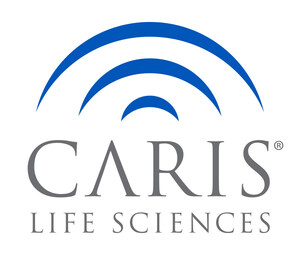Caris Life Sciences Comprehensive Tumor Profiling Research Reveals Numerous Potential Novel Treatment Approaches for 2,047 Sarcoma Patients
Combined Gene and Protein Analysis of Sarcoma Confirms the Unique Clinical Utility of Caris Molecular Intelligence™
CHICAGO, June 2, 2014 /PRNewswire/ -- Caris Life Sciences®, a leading biosciences company focused on fulfilling the promise of precision medicine, today announced the presentation of data from a study in which multiplatform biomarker assessment was used to identify multiple potential novel targets for the treatment of sarcoma, a type of cancer that begins in bone or in the soft tissues of the body. In an oral presentation here today at the 50th Annual Meeting of the American Society of Clinical Oncology (ASCO), researchers described how analysis of protein expression, gene copy variations and mutations enabled detection of an average of 25 clinically relevant alterations per patient, in 99% of sarcomas profiled, a finding that has major implications for patient selection in sarcoma clinical trials, as well as for therapeutic decision-making. This study was performed in conjunction with Fox Chase Cancer Center in Philadelphia, Penn., and Washington University in St. Louis, Mo., and analyzed patients from the Caris Registry™, a multi-center, observational outcomes database of consenting patients whose tumors underwent multi-technology profiling by Caris Molecular Intelligence™.
"Currently sarcoma oncologists select therapies for most patients based on histology and side effect profile of a particular drug. Having a biomarker that can predict sensitivity to a drug could translate into a patient receiving a drug more likely to work earlier in their disease course," explained lead investigator Sujana Movva, M.D., Medical Oncologist at Fox Chase Cancer Center. "This large data set also allows us to look at pathways that have not yet been studied in a particular histology and potentially identify new therapies."
Dr. Movva and colleagues analyzed test results from 2,047 sarcomas to identify predictive biomarkers of response to anticancer therapies. The samples comprised more than 50 histopathologic subtypes of sarcoma, 22 of which were detected in a wide range (10-630) of patients. Analytic methods included DNA sequencing via Sanger and next-generation sequencing (NGS), assessment of gene copy variations by fluorescence or chromogenic in situ hybridization (FISH or CISH) and protein expression analysis by immunohistochemistry (IHC). The research team also included Brian van Tine, M.D., Ph.D., of Washington University Medical School, Sarcoma Program director and basic translational scientist.
Select highlights from this clinical study include:
- PD-L1 expression was noted in 100 percent of liposarcomas (mostly dedifferentiated liposarcoma) and 100 percent of chondrosarcomas, suggesting immunotherapy treatment options.
- Loss or alteration to PTEN, a common tumor suppressor gene, was observed in up to 80 percent of subtypes, including osteosarcoma, rhabdomyosarcoma, epithelioid sarcoma, Ewings sarcoma, alveolar soft part sarcoma and chordoma Clinical trials are options for patients with absent or altered PTEN in these subtypes.
- SPARC is overexpressed in angiosarcoma, chondrosarcoma, EHE and osteosarcoma
- TOPO1 and TOPO2 were overexpressed in approximately 50 percent or more of sarcomas of various histopathologic types.
- Low expression of RRM1 was seen in multiple subtypes, suggesting gemcitabine may be a viable treatment option for patients with these subtypes.
- BRAF mutations were seen in MPNST, as well as angiosarcomas, suggesting that BRAF inhibitors may be a viable treatment option for patients with these subtypes.
Elaborating on their findings, the investigators suggested that further research should focus on the utility of TOPO2 overexpression as a biomarker of sensitivity to anthracyclines, especially in relation to TP53 status in a tumor. They also commented that trials of agents that inhibit proteins in the mTOR and PI3K pathways may benefit from designs in which patient selection is based on PTEN loss or on PIK3CA mutations instead of sarcoma histology. Acknowledging that the prognostic implications of the coexistence of TP53 mutations and PTEN loss in sarcomas are as yet unclear, the investigators concluded that additional research in this area will likely yield actionable findings for practicing oncologists.
"These distinct patterns of molecular changes offer a significant example of how comprehensive tumor profiling can facilitate the molecular subtyping sarcoma and provide fresh insights into biomarkers that may help identify effective treatment options for patients with specific subtypes of sarcoma," said Brian Van Tine, M.D., Ph.D., Washington University Medical School. "By adding to the knowledge base of the heterogeneity of sarcoma, these latest findings hold promise for identifying potential new targeted therapies that may help improve care for this patient community."
About Caris Molecular Intelligence™
Caris Molecular Intelligence™, the industry's leading cancer molecular profiling service, helps oncologists treat cancer smarter by delivering the most potential treatment options for patients. This service has been used by more than 6,000 oncologists to develop individualized and actionable treatment plans for more than 60,000 cancer patients in 59 countries across the globe. Caris Molecular Intelligence integrates the latest relevant panomics data - the combination of genes, proteins, molecular pathways, and unique patient characteristics - from clinical studies in cancer and cancer biology to identify the most clinically actionable drug associations approved by the U.S. Food & Drug Administration or in active clinical trials in the United States. Beyond standard DNA analysis, Caris Molecular Intelligence assesses all relevant biological components, such as RNA, protein expression and gene amplification levels, to provide oncologists with the most treatment options for their patients. Currently, Caris can identify therapeutic guidance for up to 51 drug associations, far exceeding the 19 that can be identified using next-generation sequencing alone. This therapeutic guidance is electronically delivered to the ordering physician in an easy-to-read report that enables development of tailored treatment plans. For more information on Caris Molecular Intelligence, visit www.carismolecularintelligence.com.
About Caris Life Sciences
Caris Life Sciences is a leading biosciences company focused on fulfilling the promise of precision medicine. Caris Molecular Intelligence™, the industry's first and largest tumor profiling service, provides an oncologist with the most potentially clinically actionable treatment options available to personalize care today. Using a variety of advanced and clinically-relevant technologies that assess all relevant biological components of a patient's cancer, Caris Molecular Intelligence correlates molecular data generated from a tumor with biomarker/drug associations derived from clinical cancer literature. The company is also developing a series of blood tests based on its proprietary Carisome® TOP™ platform, a revolutionary blood-based testing technology for diagnosis, prognosis, and theranosis of cancer and other complex diseases. Headquartered in Irving, Texas, Caris Life Sciences offers services throughout the U.S., Europe, Australia and other international markets. To learn more, please visit www.carislifesciences.com.
SOURCE Caris Life Sciences
WANT YOUR COMPANY'S NEWS FEATURED ON PRNEWSWIRE.COM?
Newsrooms &
Influencers
Digital Media
Outlets
Journalists
Opted In






Share this article